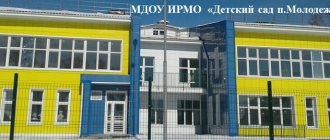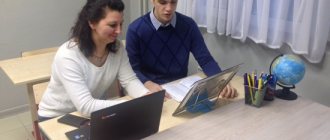Speech therapist in kindergarten
Svetlana Gogoreva
Speech therapist in kindergarten
Some parents, fortunately, do not even know why a speech therapist is needed in kindergarten . And parents of children with speech disorders had to come into close contact with the science of speech therapy and get acquainted with specialists in this field.
Speech therapy is the science of speech disorders, their overcoming and prevention through special correctional education and upbringing, which is one of the sections of special pedagogy - defectology, and is divided into preschool, school and adult. This article will mostly be devoted to preschool speech therapy . Speech therapy, which combines medicine, psychology and pedagogy, and without knowledge of the basics of these specialties, can be useless and sometimes “dangerous”
.
A kindergarten teacher-speech therapist is a multidisciplinary specialist who works with all types of speech disorders in preschool children.
What functions does a speech therapist perform in kindergarten ? A speech therapist in kindergarten conducts a complete and detailed examination of each child to determine the characteristics of his speech development. Most often this happens at the beginning of the school year, special examination protocols are used, the child’s medical record is studied, parents are interviewed, if necessary, the speech therapist can refer the child for consultation with an ENT doctor, ophthalmologist, neurologist, audiologist, speech pathologist. Ideally, a conclusion on speech The development of the child is determined collectively: by a speech therapist , a psychologist and a neurologist . And after this, the speech therapist , taking into account the characteristics of the child’s psyche and the severity of the speech defect, selects a speech correction program.
The speech correction program is carried out in stages, and in most cases, includes:
- formation of correct speech breathing,
- development of phonetic perception,
- normalization of speech motor skills,
-correction of sound pronunciation disorders,
- overcoming impairments and developing the lexical and grammatical aspects of speech,
- development of connected speech.
the speech therapist then teaches him the elements of literacy and prepares him for studying at a comprehensive school. The duration of the correction program depends on the severity of the speech disorder, the psychological and neurological status of the child, and on the professionalism of the speech therapist . Each lesson conducted by a speech therapist in kindergarten is a whole range of games and exercises, as well as various types of gymnastics and massages for children’s tongues. In classes, the speech therapist uses toys , pictures, musical instruments and a lot of various teaching aids. And the most important attribute of the classes is the mirror, in front of which most tasks are performed. has speech therapy instruments - probes for massage and sound production. A speech therapist in kindergarten regularly conducts not only frontal (classes with the whole group), but also subgroup and individual classes.
What speech disorders does a speech therapist correct in kindergarten ?
1. Impaired oral speech:
- dyslalia (tongue-tied)
– disturbance of sound pronunciation with normal hearing and preserved innervation of the speech apparatus;
-dysarthria – a violation of the pronunciation side of speech, caused by insufficient innervation of the speech apparatus;
-rhinolalia – disturbance of voice timbre and sound pronunciation caused by anatomical and physiological defects of the speech apparatus;
- stuttering is a violation of the tempo-rhythmic organization of speech, caused by the convulsive state of the muscles of the speech apparatus;
-bradylalia – pathologically slow rate of speech;
-tachylalia - pathologically accelerated rate of speech;
-alalia is the absence or underdevelopment of speech due to organic damage to the speech areas of the cerebral cortex in the prenatal or early period of a child’s development.
In addition to problems with oral speech, children suffer from a written language disorder, which is corrected at school.
2. Violation of means of communication:
-FNR – phonetic speech underdevelopment. This is a violation of sound pronunciation with normal physical and phonemic hearing and the normal structure of the speech apparatus. There may be a disorder of a single sound or several sounds at the same time. Such disorders may manifest themselves:
• in absence (omission)
sound - aketa instead of rocket
• in distortions - throaty pronunciation of the sound r, buccal pronunciation - sh, etc.
Incorrect pronunciation can be observed in relation to any consonant sound, but less often those sounds that are violated are those that are simple in the method of articulation and do not require additional movements of the tongue (m, n, p, t; most often violated:
- whistling sounds - S, Z (and their soft pairs, C;
-hissing sounds – Ш, Ж, Х, Ш;
- sonorant (lingual)
– L, R
(and their soft pairs)
;
-rear lingual – K, G, X (and their soft pairs)
.
Most often, a speech therapist in kindergarten takes children with FND for six months.
-FFNR - phonetic-phonemic speech underdevelopment. This is a violation of the processes of formation of the pronunciation system (native)
language in children with various speech disorders due to defects in the perception and pronunciation of sounds.
With intact physical hearing, children cannot distinguish or confuse similar sounds (whistling and hissing; sonorant; soft and hard; voiced and dull)
.
For example, when asked to repeat a number of different sounds or syllables , the child repeats all sounds or syllables as the same (pa-pa-pa instead of pa-ba-pa)
.
And, when a speech therapist in kindergarten asks what sounds he hears? The kid replies that the sounds are the same. It is not physical, but phonemic hearing (hearing for phonemes)
. And, as a result of a number of reasons, it turns out to be disturbed or unformed.
A phoneme is the minimum unit of sound structure of a language. Each phoneme in speech is represented by its own variants (allophones)
. A phoneme has a main variant - a sound in a strong position: for vowels - this is the position under stress, for consonants - the position before the vowel or sonorant.
Several conditions are identified in the phonetic-phonemic underdevelopment of children:
• difficulties in analyzing sounds that are disturbed in pronunciation;
• with formed articulation, inability to distinguish sounds belonging to different phonetic groups;
• inability to determine the presence and sequence of sounds in a word.
The main manifestations characterizing FFNR:
1. Undifferentiated pronunciation of pairs or groups of sounds, i.e. the same sound can serve as a substitute for two or more sounds for a child. For example, instead of the sounds “s”
,
“ch”
,
“sh”
the child pronounces the sound
“s”
:
“syumka”
instead of
“bag”
,
“syasya”
instead of
“cup”
,
“syapka”
instead of
“hat”
.
2. Replacement of some sounds with others that have simpler articulation, i.e. complex sounds are replaced by simple ones. For example, a group of hissing sounds can be replaced by whistling sapka instead of hat, “r”
is replaced by
"l"
laketa instead of rocket.
3. Mixing of sounds, i.e. unstable use of a number of sounds in different words. A child can use sounds correctly in some words, but in others replace them with similar ones in articulation or acoustic characteristics. For example, a child can correctly pronounce the sounds “r”
,
“l”
and
“s”
in isolation (i.e. one sound, not in a syllable or word, but in speech utterances instead of
“red cow”
he says
“lyzaya kalova”
.
In addition to the listed features of pronunciation and phonemic perception, children with FFDD exhibit: general blurred speech, unclear diction, some delay in the formation of vocabulary and grammatical structure of speech (errors in case endings, use of prepositions , agreement of adjectives and numerals with nouns).
A speech therapist in kindergarten children with such a speech disorder for correctional classes throughout the year.
-ONR – general speech underdevelopment. As the name suggests, with this type of disorder, all components of the speech system, that is, the sound side (phonetics)
– violation of sound pronunciation and phonemic perception;
semantic side (lexis, grammar)
- poor vocabulary, few generalizations, synonyms, antonyms, etc., errors in inflection and word formation, difficulties in coordinating words; poor development of coherent speech - the ability to tell and retell.
Children with OHP are characterized by:
•later onset of speech: the first words appear by 3-4 years, phrasal speech of two words by 5 years;
• speech is full of agrammatisms (irregular forms and variants of words)
and not sufficiently phonetically designed;
• expressive speech lags behind impressive speech, that is, the child, while understanding the speech addressed to him, cannot correctly voice his thoughts;
• the speech of children with ODD is difficult to understand.
Most often, when talking about ODD, they mean speech disorders in children with normal intelligence and hearing. The fact is that with hearing or intellectual impairments, speech underdevelopment, of course, occurs in most cases, but in this case, OHP already has the character of a secondary defect.
The formation of correct speech development is a complex process - it requires the joint work of a doctor - a neurologist, speech therapist , psychologist, educator, music worker, and physical education specialist. This work must be coordinated and comprehensive. By actively influencing the child with specific professional means, teachers build their work on the basis of general pedagogical principles. At the same time, by identifying objectively existing points of contact between various pedagogical areas, each teacher does not carry out his work in isolation, but complementing and deepening the influence of others. Therefore, taking into account the individual characteristics of each child with speech impairments, preschool education specialists outline a unified set of joint correctional and pedagogical work aimed at the formation and development of the motor, intellectual, speech and social-emotional spheres of personality development of a preschool child.
And at the end of my work, I would like to say that parents play an equally important role in the speech development of children. Therefore, in addition to classes with the child, the speech therapist in the kindergarten provides consultations to parents, during which he explains to the parents the child’s speech defect and teaches the necessary techniques and exercises for homework.
Thank you for your attention!
Job responsibilities of a speech therapist teacher in a preschool educational institution. material (group) on the topic
JOB RESPONSIBILITIES
speech therapist teacher at the speech center
- General provisions.
1.1. A speech therapist teacher is appointed and dismissed by the head of the educational institution.
1.2. A speech therapist teacher must have a higher education in defectology and improve his qualifications.
1.3. A speech therapist teacher in his work is guided by the Constitution of the Russian Federation, the laws of the Russian Federation, decisions of the government of the Russian Federation and educational authorities on educational issues; the Convention on the Rights of the Child; Charter of a preschool educational institution; instructions for protecting the life and health of preschool children, this job description; must know developmental and special pedagogy and psychology, anatomical, physiological and clinical foundations of defectology, methods and techniques for preventing and correcting disorders in the speech development of students (pupils), regulatory and methodological documents on issues of professional and practical activity, program methodological literature on working with students (pupils) with speech development disorders; the latest achievements of defectological science; rules and regulations of labor, safety and fire protection.
- Functions.
2.1. Carries out work aimed at preventing and maximizing correction of specific speech disorders and other deviations in the development of mental processes (memory, thinking, attention, etc.).
2.2. Develops an action plan aimed at preventing speech disorders in children (pupils) (consultations, seminars for educators, other preschool specialists, parents (persons replacing them) on working on the sound culture of speech).
- Job responsibilities.
3.1. Examines and determines the structure and severity of speech disorders of various origins in students aged 3 to 7 years.
3.2. Completes groups for classes taking into account speech impairments of students.
3.3. Conducts subgroup and individual classes to correct deviations in speech development and restore impaired functions.
3.4. Works closely with teachers and other specialists of the educational institution, and attends classes.
3.5. Consults teaching staff and parents (persons replacing them) on the use of special methods and techniques to assist children with speech development disorders.
3.6. Maintains necessary documentation.
3.7. Promotes the formation of a general personal culture, socialization, informed choice and mastery of professional programs.
3.8. Uses a variety of forms, methods, techniques and means of teaching and correction within the framework of state standards.
3.9. Provides a level of training for students (pupils) that meets the requirements of the state educational standard, and is responsible for their implementation in full.
3.10. Implements educational programs of a preschool educational institution.
3.11. Respects the rights and freedoms of students (pupils) contained in the Law of the Russian Federation “On Education”, the Convention on the Rights of the Child.
3.12. Systematically improves his professional qualifications.
3.13. Participates in the activities of methodological associations and other forms of methodological work to exchange experience in his educational institution, district, district, city.
3.14. Works according to a schedule based on a 20-hour work week, approved by the head of the educational institution, agreed with the trade union organization.
3.15. Communicates with parents (persons replacing them).
3.16. Ensures the protection of life and health of students (pupils) during the educational process.
3.17. Complies with labor protection, safety and fire protection rules and regulations.
3.18. Carries out dynamic observation of children who have completed a course of correctional classes through interaction with primary school teachers, speech therapists in schools, and teachers in preschool educational institutions.
- Rights.
4.1. A speech therapist teacher has all social rights provided for by the legislation of the Russian Federation.
4.2. A speech therapist teacher has the right to be present at any classes conducted with preschoolers.
4.3. Improve your skills.
4.4. Pass certification in accordance with the “Regulations on the procedure for certification of pedagogical and managerial employees of state and municipal educational institutions” dated June 26, 2000 No. 1908.
4.5. Has a vacation of 56 calendar days (48 working days).
- Responsibility.
5.1. The speech therapist teacher is responsible for organizing propaedeutic and correctional work in an educational institution.
5.2. For non-fulfillment or improper execution without good reason of the Charter and Internal Labor Regulations of an educational institution, for violation of official duties established by this Instruction, other local regulations, legal orders of educational authorities, orders and orders of the head of an educational institution, he is subject to disciplinary punishment up to and including dismissal from positions.
5.3. For violation of instructions for protecting the life and health of children, sanitary and hygienic rules for organizing the educational process, a teacher-speech therapist is brought to administrative responsibility in the manner and in cases provided for by law.
The main areas of activity of a speech therapist in preschool institutions
The main areas of activity of a speech therapist in preschool institutions
1. Diagnostic activity
The diagnostic activity of a speech therapist in a preschool educational institution makes it possible to determine the tactics of corrective action, the choice of means and ways to achieve set goals.
The diagnostic activity of a speech therapist at a preschool educational institution involves:
1) Early identification of children with developmental problems, that is, examination of pupils of general developmental preschool educational institutions (groups) and identification of children among them who need preventive and correctional speech assistance. The result of the diagnostic work is the preparation of materials for PMPK for the purpose of completing specialized groups for children with speech disorders and individual lessons with a speech therapist.
2) Initial speech therapy and psychological and pedagogical examination of children, which involves studying the level of speech, cognitive, social, personal, physical development and individual typological characteristics of children in need of speech therapy support, determining the main directions and content of work with each of them.
The purpose of such an examination of children is to establish the causes, structure and severity of deviations in their speech development, which makes it possible to formulate an objective speech therapy conclusion and outline individual programs of correctional and pedagogical work for the long term (academic year).
3) Collection of medical and pedagogical anamnesis, information about early development.
4) Dynamic observation during the learning process, intermediate sections. Goal: analysis of the effectiveness of the correctional pedagogical process.
2. Corrective and developmental activities
The speech therapist teacher is the coordinator of correctional speech work in a preschool educational institution, organizes the integrative activities of all participants in the correctional educational process, the main subjects of which are: a child with special educational needs, the teaching staff of the preschool educational institution, and the parents of the speech-language pathologist child.
The correctional and developmental area of work of a speech therapist within a speech therapy group includes:
- Classes of a speech therapist with children to improve different aspects of speech.
- Joint activities with a teacher-psychologist to stimulate the psychological basis of speech.
- Joint activities with teachers.
- Joint activities of a speech therapist and music director to develop the tempo-rhythmic organization of speech.
- Joint activities of a speech therapist and a physical education teacher to develop children’s gross motor skills.
The correctional work of a speech therapist with children is aimed at overcoming speech and psychophysical disorders by conducting individual, subgroup, and frontal speech therapy sessions.
In frontal classes on the development of lexical and grammatical categories, work is carried out to expand and activate children's vocabulary with the names of objects, their parts, qualities, actions, and to correctly correlate the word with the image of the object. Generalizing concepts are introduced and clarified. The word-formation function of speech and inflection are formed and developed.
In subgroup classes on the development of coherent speech, children learn to compose various sentence models, retell and compose stories based on demonstrations of actions, a series of plot pictures, a plot picture, personal experience, descriptive and creative stories.
In classes on the sound culture of speech and preparation for learning to read and write, children learn to correctly pronounce the sound being studied, differentiate it by ear and in pronunciation, perform sound-letter analysis and synthesis of syllables and words.
In individual lessons with children the following is carried out:
1. Breathing exercises (formation of a long, strong, smooth air stream for the correct pronunciation of sounds);
2. Articulation gymnastics (various exercises to develop the muscles of the articulatory apparatus);
3. Finger gymnastics (exercises and games to develop motor skills of the fingers);
4. Correction of sound pronunciation in different ways;
5. Automation of sounds in speech;
6. Differentiation of sounds in speech;
7. Enrichment of vocabulary;
8. Consolidating the knowledge acquired by children in fontal and subgroup speech therapy classes.
All of the above classes improve motor skills, coordination, spatial orientation and constructive praxis. This work is linked to the development of speech skills and the formation of relevant concepts. It is based on the formation of in-depth ideas and real knowledge of children about the world around them. The development of their speech is built on this subject base. The results of speech therapy work are noted in the child’s speech record at the time of graduation and are brought to the attention of the teacher, kindergarten administration and parents.
3. Advisory and educational work with parents and teachers
The educational activities of a speech therapist within a speech therapy group involve joint holding of parent meetings, at which they talk about the developmental characteristics of children in the speech therapy group, risk factors, the main directions of correctional and developmental work, and also give practical recommendations.
Promotion of speech therapy knowledge - increasing the level of professional activity of teachers and parents' awareness of the tasks and specifics of speech therapy correctional work. It is carried out through pedagogical councils, methodological associations, parent meetings, individual and group consultations, conversations, seminars, open classes, a speech therapy stand for parents and educators with replacement materials.
The advisory work of a speech therapist at a preschool educational institution is advising parents, educators, and related specialists on the problems of teaching and raising children with speech disorders. It is carried out in the form of individual and group consultations, conversations, open classes, and seminars. The main areas of advisory and educational work of a speech therapist with parents are:
- Formation of positive motivation to interact with the teacher, activation of interest in classes on the development and correction of speech, preparing children for learning to read and write, correction of written speech disorders.
- Developing an adequate attitude to the peculiarities of children’s speech activity.
- Formation (increase) of competence in matters of speech development (ontogenesis) of children of different age groups and speech disorders (expressive and impressive speech, writing and reading).
- Training in basic techniques of correctional and developmental work (articulatory gymnastics, some types of speech therapy games, basic rules (algorithms) for completing written assignments, etc.).
- Familiarization with various types of teaching aids and literature on organizing and conducting developmental classes at home.
4. Methodological activity
The methodological activities of a speech therapist at a preschool educational institution include:
- development of methodological recommendations for speech therapists, educators and parents on providing speech therapy assistance to children;
- long-term planning;
- studying and summarizing best practices;
- participation in the work of methodological associations of speech therapists;
- exchange of experience (conferences, seminars, open screenings, etc.);
- searching for the best means of correcting children's speech;
- study and implementation of variable forms of providing correctional assistance;
- self-education;
- production and acquisition of visual and didactic material on the development and correction of speech.
5. Analytical activities
Analytical work will allow the speech therapist to track the effectiveness of the ongoing correctional and developmental activities, i.e. highlight all possible positive and negative aspects of this activity, and also track the dynamics of the development of each child. It includes:
- Carrying out control sections and test tasks (if necessary).
- Conclusion of the PMPC on the issue of releasing children.
- Graduation interviews (final events).
- Summing up the work for the academic year. A digital report is an analysis of the work done by a speech therapist teacher.





